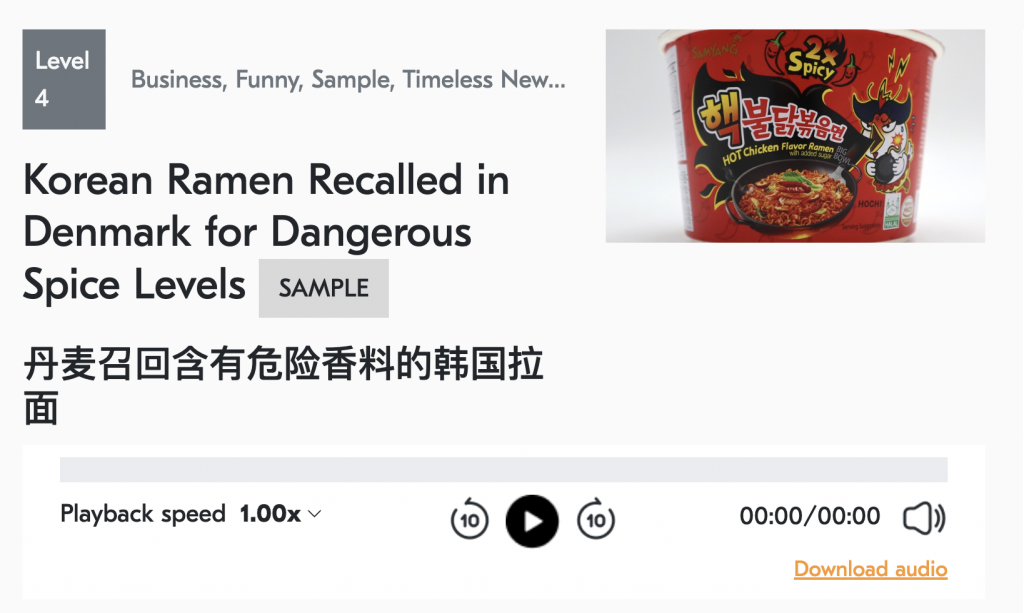
These are the resources and media I find to be the most useful in learning Mandarin.
Just to clarify, this is purely based on my personal opinion! They’re either the ones I’ve had the most success with, or just really vibed with. Over the last 7 years, I’ve tried plenty of tools and platforms (probably dozens), but obviously not everything out there. These are the ones that stuck with me and that I still rely on today.
I’ll categorise each resource into 4 main areas they provide the most benefit: listening, reading, speaking, and writing.
I’ll try to keep this page up to date if I find a new favourite. 🤗
What counts as intermediate?
Yeah… it’s a really subjective definition. I’d say intermediate is when you’re able to handle everyday conversations without too much effort, and understand the main topics in TV shows (but not 100% of it). In terms of the HSK levels I’d put this at about HSK5. Althugh most resources I’ve written should be helpful no matter your Mandarin level.
Best learning resources
Pleco
reading
The quintessential Chinese language dictionary. If I were only allowed one language learning app it would be this.
The app is completely free, but I would highly recommend investing into one of their bundles – it’ll be the best Chinese learning investment you make. The bundle contains things like OCR, stroke order diagrams, handwriting, audio pronunciation add ons.
Podcasts
listening
These are the podcasts that have stuck with me, and I continue to listen to every week:
- 大叔中文 Dashu Mandarin Podcast – this is my favourite podcast and I listen to every new episode. The presenters are are three guys from different parts of mainland China and Taiwan, which makes it a good way to practice recognising different accents. They talk about a variety of genuinely interesting topics, and take it in turns to express their opinion and make jokes about each other. I’ve felt my listening comprehension improve massively through listening to this podcast and they keep me engaged all the way through – although it is slightly more suitable for upper-intermediate learners.
- 听故事说中文 Learning Chinese through Stories – this was probably the first Chinese-speaking podcast I ever properly got into! I’ve been listening to it on and off for years now. There are two presenters, a wife and husband, telling and then explaining stories (in the early episodes these are mainly 成语chengyu stories). They provide episodes graded at different levels which tend to come in two parts; the first (the “story”) is short and contains lots of new words or phrases. And the second part (the “walkthrough”) is the main way you’ll learn new stuff. They repeat new phrases in several different ways which really reinforces the phrases you’ve already learnt, and give lots of examples to make sure it sticks.

TV shows
listening, reading
Firstly, I’ve found it way better for my language comprehension to watch Chinese TV shows with Chinese subtitles. Watching with no subtitles at all can be okay, but I find it’s easy to get lost especially if the main characters have strong regional accents. Having the subtitles as a crutch really helps my comprehension of the plot, and it helps my reading ability as a nice side-effect! These are my favourite Chinese TV shows (all of them can be found on YouTube):
- 都挺好 All is Well – a family drama that made me laugh out loud so much. It’s about a dysfunctional family trying to navigate the aftermath of the mother’s death, and how all of the siblings struggle to handle 苏大强 – the fairly useless, selfish, elderly father of the family. It’s well worth a watch in my opinion; it explores traditional gender roles, favouritism, and the sense of familial responsibility in Chinese culture. All the while remaining very light-hearted and easy to follow.
- 三十而已 Nothing But Thirty – another easy-to-watch drama. It follows the stories of three women living in Shanghai as they each turn 30 years old. I found this a little harder to follow at times than 都挺好, but by the end of it I was so invested in the characters I think I binged the last 5 episodes in one sitting. Expect lots of relationship drama from start to finish.
- 奔跑吧 Keep Running – this one’s a little different from the first two, this one is a variety show where celebrities compete in physical and mental challenges in teams. It can be incredibly funny, my partner and I sometimes watch it while we’re eating dinner. It’s a great way to learn slang and celebrity stuff, and also to see how people actually interact with one another in a competitive game show setting and the different personalities on show. When I watch it I feel like I’m learning how Chinese banter works.


Honorary mentions:
- 白夜追凶 Day and Night – a detective crime series following twin brothers (one a detective, one a fugitive) trying to crack a mystery. A really fun watch, but quite difficult to follow for me. There was a bit too much forensic and legal terminology for me, and a lot of the characters spoke too quickly to understand. It’s been a long time since I watched it though, I’d like to rewatch it some time.
- 明星大侦探 Who’s the Murderer – another gameshow, like 奔跑吧, except the celebrities are trying to guess who the murderer is and discover clues throughout the show. I enjoyed this one mostly for the murder mystery style element (I’m a big fan of Agatha Christie books), but there are a bit too many weird words to make it feel useful in daily life.
Tofu Learn
writing, reading
Tofu Learn is a cross between Anki and Skritter. I’ve used Skritter in the past to practice writing, but I prefer Tofu because it’s free! And I do still use Anki flashcards alongside it, but theoretically you could use Tofu for both recognition and writing practice. There is no more efficient way to hammer in that character recognition, than a daily dose of Anki flashcards on the way to work.
They have character lists categorised into HSK level so you can pick and choose what characters to practice super easily. My writing ability is way beyond my reading and listening level, so I’ve recently been hammering away at Tofu to try and catch up.
My only criticism is that it this “flashcard” style of practice can feel quite bland and meaningless after a while, so I’d definitely consider it as a supplement to other resources.
Chairman’s Bao
reading
Chairman’s Bao is a tool for reading news articles in Chinese. You can click on words you don’t know for a quick translation, and listen to the article as you read. They’re categorised by HSK levels, so it’s super easy to find content that matches your Chinese proficiency. There are also super helpful built-in tools to learn new words or keep record of the ones you weren’t sure of. Since there’s a huge variety of content, so it’s easy to find something that’s interesting to you.

Social media
reading, writing (typing)
小红书 (RED) is a great place to get pushed content that’s interesting to you. I’m not a huge fan of social media and I really try hard to manage my screen time. But if it’s in Chinese then perhaps it counts as learning? You’ll find native content in fitness, or music, or sports, or literally whatever you’re interested in and you don’t even need to search for it; the algorithm figures out what you like pretty quickly.
HelloTalk
writing (typing), speaking, reading, listening
HelloTalk and Tandem are two very similar apps where you can chat to native speakers. Typically you specify your target language level and native language, and you connect with people learning your native language who speak your target language natively.
There is functionality to correct people, so if I make a grammatical mistake people can correct me. There’s also functionality to record a message rather than type it, so you get to practice speaking and listening with your language buddy.
One issue with the app is that you might need to go through a few bad conversations before you find one or two gems. There are a fair few people uninterested in learning, and I’ve even seen scammers and people who just want to date! So, filtering through those can feel like a chore. But I’ve had a few really good conversations on HelloTalk where I felt like I learnt a lot, and got to practice making plenty of mistakes in a very low-stakes environment.
Lessons!
speaking, listening, reading, writing
Without a doubt, the best resource of all is to join weekly lessons with a teacher. It’s well worth the cost. For most of my Mandarin learning journey I’ve been a bit cheap, and opted to self-study the HSK courses 1-5 and try doing it all myself. But I’ve become more open to lessons recently, and started joining classes with Manhattan Mandarin aimed at HSK 5 level.
It’s a great way to practice your speaking with the teacher and other students, get corrected instantly, practice small talk, and learn content in a fun and engaging way. In the past I’ve tried one-on-one lessons with a tutor, but I found those to be very exhausting. With a small group (~3-4 other students) I get ample time to practice speaking, but also take a step back and absorb what other people are saying – as opposed to being fully switched on in ‘Mandarin mode’ for 1.5 hours straight in one-on-one lessons. I’m really happy with the current class size and structure and this is probably the best learning resource I’m using at the moment.
If you don’t have access to in-person lessons, you can also find tutors online through sites like iTalki.
Thoughts on Duolingo
DuoLingo is a strange language learning method. I’ve got some friends who swear by it, and that their 300-day Duolingo streak has meant they can order food and chat with locals on holiday.
On the one hand, Duolingo is a low-effort, gamified way to get in your daily dose of language practice. On the other hand, it’s low-effort and gamified 😅 — it can make you feel like you’re making progress when really you’re just learning lots of random sentences out of context.
I personally dislike learning Mandarin through Duolingo for the following reasons:
- It introduces characters from the start, but I think that beginners should focus on pinyin and pronunciation to build a good foundation
- It tempts you into using Duolingo as a stand-alone method, when in reality effective language learning needs a combination of approaches for a well-rounded proficiency
- It’s not really like human interaction at all, and it teaches you little about the culture or value systems held by native speakers
- I don’t like relying on dopamine hits to keep myself motivated
- Sentences are either too simple or impractical for real-world conversations. Eventually you need to read or speak more than 10 seconds of text at once.
Duolingo has its place — it’s great for building a habit and getting exposure to the basics. However, it’s best used as a supplement rather than a primary method (in my opinion).
Conclusion
That’s about it. It was really satisfying putting this list together, because I got to reflect on all of the trial-and-error I’ve been through with different apps and websites, and clarify my favourite parts of learning Mandarin.
